- Home
- Julia Quinn
The Other Miss Bridgerton Page 11
The Other Miss Bridgerton Read online
Page 11
She cleared her throat. “I’m finding it difficult to tell the difference between pink and this shade.” She held up a piece that obviously contained both water and land. One corner was light blue, and the rest was something slightly peachy.
“This one is definitely pink,” he said near her ear, and then he leaned forward, his arm stretching past her as he reached for a triangular piece at the back of the array. The linen of his shirt whispered against the back of her head, and for a moment she could not remember how to breathe.
She could not remember if she knew how to breathe.
He set the piece into her pink pile and drew his arm back, lightly grazing her shoulder.
Her skin tingled.
It was the heat. It had to be. The sun had finally traveled high enough so that it was no longer streaming through the windows, but the cabin had had the entire morning to warm up. She’d been so engrossed in the puzzle that she hadn’t really noticed it. But now she had that prickly feeling one got when one needed a cool drink. And much the way she could never ignore hiccups when her mother said, “Just forget about them, and they’ll go away,” she could not stop being so aware of the sensation.
And of him, scandalously close.
The captain reached for another piece, this one lavender, but it was farther than the other one had been, and when she turned, she saw that his head was right next to hers. If he turned . . . If she turned . . .
It would be a kiss.
“Stop!” she cried out.
He straightened. “Is something wrong?”
“No,” she said, utterly mortified by her outburst. “No. No.” She tried to make the last no sound droll, but she had a feeling she had not succeeded. She cleared her throat, giving herself an extra few seconds to compose herself before she spoke again, and when she did, her hands were spread out like starfish on the table to steady her. “It is simply that I wish to complete this on my own. I don’t want any help.”
He’d moved out from behind her, and when she looked at his face she was relieved to see that there was nothing roguish or teasing or even knowing in his expression. Instead, he almost looked sheepish.
“Sorry,” he said. “I love things like this.”
“It’s—it’s all right,” she said, hating the stammer in her voice. “Just . . . no more.”
He stepped away, and she thought he was headed for the door, but suddenly he stopped and turned around, resting his hands on the back of the chair across from her. “Why are you being so agreeable?”
She blinked. “I beg your pardon?”
“You’re remarkably amiable today.” His eyes narrowed, but he didn’t quite look suspicious.
“As opposed to . . .”
His head tilted to the side, as if he hadn’t considered this. “When you arrived, I suppose.”
“You mean in a sack?”
He waved that off. “Is it the puzzle?”
“Well . . .” Poppy paused, unsure of how to answer his question. Why was she being agreeable? The maddening man was holding her against her will—not that she could do anything about it, here on the open ocean. Perhaps she would behave differently if she was at an inn or a house—someplace from which she could reasonably envision escape. But here on the ship there was nothing to be gained from being contrary. Not when she had to spend a fortnight in his company.
She looked over at the captain, hoping that she’d stalled long enough for him to have moved on, but no, he was still staring at her with bright blue expectation, awaiting her answer.
“I suppose,” she said carefully, “it’s simply because I have no good reason not to be agreeable. I can’t go anywhere. I certainly can’t escape, and I’d have to be an idiot to think I’d fare better on my own in Portugal than with your protection. So like it or not, I’m stuck with you.”
He nodded slowly. “As I am with you.”
“Oh,” she added with particular emphasis, “and I don’t like it.”
His chin drew back, adding to the air of puzzlement that marked his face.
“I said ‘like it or not,’” she explained. “I want to make it clear that I don’t. Like it, I mean.”
“So noted,” he remarked.
“But,” she added, coming to her feet, “you have treated me with a small measure of respect, so I am endeavoring to do the same.”
One of his brows arched. “Just a small measure?”
She met this expression with her own. “You still sleep in this room, do you not?”
“For your protection,” he reminded her.
“The door locks.”
“I’m not sleeping below.”
“As I have yet to see an inch of the ship other than this cabin and the corridor outside, I could not say if the berths below would be appropriate.”
He smiled condescendingly. “Trust me when I tell you that even if you did have free rein of the Infinity, you would not be permitted anywhere near the sailors’ quarters.”
She tipped her head toward the door. “I counted three other cabins on this deck.”
“So you did. They are very small.”
“But large enough for two men, I would think. Don’t Brown and Green share?”
“Neither Brown nor Green is the captain of this ship.”
“So what you’re actually saying is that it is your pride that is too large to share a cabin.”
“I’m sharing one with you.”
“A decision I still cannot comprehend.” She snorted. “You do realize that if we were anywhere else, you’d have to marry me.”
This made him grin, and it was a lethal, devilish thing. He leaned toward her. “Why, Miss Bridgerton, are you asking for my hand?”
“No!” she practically howled. “You’re twisting my words.”
“I know,” he said, almost sympathetically. “You make it so easy.”
She scowled. “I take back everything I said about your being a gentleman.”
Still, he kept smiling. The wretched man found this amusing. Or more to the point, he found her amusing, which was considerably worse.
“As it happens,” he said, “I have decided to sleep in my navigator’s cabin tonight. There are indeed two berths there.”
“You just said—”
He held up a hand. “A wise man never argues when he’s getting his way. The same goes for women, I should think.”
He was right, damn it. Still . . . “What brought on this change of heart?” she asked suspiciously.
“Oh, let’s see . . . My sore neck, my aching back, and the fact that I nearly fell asleep at the wheel this morning.”
“Really?”
“No, not really,” he retorted. Then he might have groaned. “But I wanted to.”
Poppy tried to appear contrite. She really did. But there was something delicious about the thought of him falling asleep while on duty, and she hadn’t been able to keep all the glee from her voice.
Schadenfreude, meet Poppy Bridgerton.
“I have taken measure of the crew’s mood,” Captain James said, “and I am confident that you will remain unbothered.”
She nodded demurely. She had won. She had won! But she knew men, and she knew she had to let him think the victory was his. So she gave him a pretty smile and said, “Thank you.”
He crossed his arms. “You will, of course, keep the door locked.”
“As you wish.”
“And you must understand that this is still my cabin, and I will be in and out during the day.”
“All of your things are here,” she murmured agreeably, although she might have ruined it when she added, “See how agreeable I am?”
Chapter 10
Agreeable, indeed. The chit was up to something. Although what, Andrew could not envisage. He’d believed her when she said she wasn’t plotting an escape. She was far too intelligent for that. He supposed she might try something when they were back on British soil, but certainly not before.
But when they were back on British so
il . . . well, he wanted to be rid of her then, didn’t he?
“Is something wrong?” he heard her ask. “You look very skeptical all of a sudden.”
He looked over at her. Brown hair, green eyes, blue dress . . . everything was the same. And yet he felt different.
But it wasn’t because of her, he told himself. True, her presence had turned this voyage into one like no other, but she was not the reason for his unease. He’d been feeling not quite right for several months now.
Something inside of him had jolted out of place. He felt off-center.
Restless.
It was a sensation that he usually took to mean it was time to set sail. His wasn’t a soul that was meant to remain too long in one place. This was a basic fact of his existence, as much a part of him as his cheeky humor, his blue eyes, or his fascination with all things mechanical. It was why he’d begged his parents to allow him to withdraw from Eton in his final year and join the navy. It was why they’d let him, even though he knew they would rather he’d finished his studies.
They didn’t even try to suggest that he go on to Cambridge, despite the fact that Andrew had always had a passion for engineering and architecture and could have probably used some tutelage.
He could never have made it through three years at university. Not then, at least. He could barely sit still. Lectures and seminars would have been absolute torture.
But it was a different sort of restlessness that had recently taken root in his chest. A need for change, yes, but not constant change. He saw that cottage again, the one that had been lurking for so long at the back of his mind. It altered a little each time he thought of it . . . a trellis here, new stonework there . . . And of course he was never quite sure how large it ought to be. Did he want to live by himself? Have a family?
It couldn’t be too small, he decided. Even if he never had a family of his own, he’d want plenty of room for his nieces and nephews. Children needed room to run wild, to explore. His own childhood had been magnificent. The Rokesby and Bridgerton children had formed their own little tribe, and they’d had the entirety of two estates to roam. They’d fished and climbed, and created all sorts of sketches of the imagination with princes and knights, pirates and kings. And of course Joan of Arc and Queen Elizabeth, because Billie Bridgerton had refused to be cast as a damsel in distress.
When it rained, they played games and built houses out of cards, and Andrew supposed there had to have been lessons in there at some point, but even those had been made enjoyable by his parents’ expert picks for tutors. They had understood that learning could be fun, that there was nothing to be gained by a slavish devotion to discipline, at least not with children whose ages remained in the single digits.
His parents were remarkably wise people. How ironic and, he supposed, logical that none of their children would truly realize this until they too were adults.
He really needed to get back to see his family. It had been much too long.
“Captain James?”
Miss Bridgerton was standing next to him now; he had not even realized she’d got up from the table.
“Captain James?” she said again. “Are you all right?”
“Sorry.” He gave himself a mental shake. “I was just thinking . . .” Well, honestly, there was no reason not to tell her the truth. “I was thinking about my family.”
“Ah yes, your brother,” she said, her eyes crinkling with something approaching mischief. “The one who does not exaggerate. Married to a gruesome hater of strawberries.”
And just like that, she made him laugh. “I assure you, she’s hardly gruesome. You’d like her, actually. She—”
He stopped. He’d been about to tell her how Cecilia had crossed an ocean to look for her wounded brother, how she had feigned marriage to a man who had lost his memory so that she might continue to nurse him through his injuries. Cecilia had not thought herself particularly daring or headstrong—she still didn’t—and she often said that she’d be happy never to travel more than fifty miles from her home again. But when she needed it—when others had needed it—she had found her strength.
But he could not reveal more information about his family. He shouldn’t even have mentioned Edward’s name, but honestly, what family didn’t have an Edward in a recent branch of their tree? If he started talking about George and Nicholas and Mary, however . . . That combination of names was considerably more distinctive. And with the aforementioned George married to Poppy’s cousin Billie . . .
“Do you miss them?” Miss Bridgerton asked.
“My family? Of course. All the time.”
“And yet you’ve chosen a life at sea.”
He shrugged. “I also like the sea.”
She considered this for a moment, then said, “I don’t really miss mine.”
He looked at her with frank astonishment.
“I mean, of course I miss them. But I wasn’t meant to be with my family right now, anyway.”
“Ah yes,” he recalled. “You were visiting your friend in Charmouth. Mrs. Armitage.”
She blinked in surprise. “You remember her name?”
“I have to return you to her, don’t I?”
Her mouth opened, but then he saw her expression and realized—
“For the love of Christ, woman, you didn’t think I was just going to drop you at the docks, did you?”
Her lip caught between her teeth. “Well . . .”
“What sort of man do you think I am?” He stalked away, furious at her assessment of him. “Bloody hell, woman, you’re the one who keeps insisting I’m a gentleman. How could you think I would not see you safely to your friend’s doorstep?”
“You did kidnap me,” she pointed out, almost politely.
“That again,” he ground out.
Her eyes widened, and she made a sound that clearly translated to: You did not just say that.
He planted his hands on his hips. “We have already established that I had no choice.”
To that she responded with a one-shouldered shrug. “So you say.”
He supposed she had a point there, but it wasn’t as if he could explain himself to her. His own parents didn’t even know that he had spent the last seven years in secret service to the crown.
Still, he wasn’t going to rise to her bait and get into another argument about how and why she’d come to be on the Infinity. “Regardless,” he said, his tone pointedly firm, “you will not be left at the docks like some unwanted cargo. I’m not yet certain how we will see you home, but we will, you have my assurance.”
He stared her down, waiting for her response.
Which she gave.
“Technically,” she said, with the careful expression of one who is picking through needles, “I am unwanted cargo.”
It took him a moment to digest this. “That is the point you wish to argue?”
“Well, I’m certainly not going to argue that you shouldn’t return me safely to Briar House. Although you might wish to be careful.” Her brows rose, calling to mind the many times Andrew’s sister—and his sister-in-law and his other sister-in-law—doled out unnecessary advice.
“Elizabeth is not so willing as I to bend rules,” Miss Bridgerton said. “She may very well have summoned the authorities.”
Not to mention the entire Bridgerton family, he thought grimly.
She walked back over to the table. “It would probably be unwise of you to approach the house.”
He almost smiled. “Are you worried I might be arrested?”
She snorted. “I have every faith you’ll escape the law.”
He wasn’t sure it was a compliment. But he also wasn’t sure that it wasn’t. And he definitely wasn’t sure which he would rather it be.
He cleared his throat. “I should be getting back. There is much that requires my attention.”
She nodded absently, inspecting several puzzle pieces. “I would imagine so. I’m surprised you have remained in the cabin as long as you have.”
Not as surprised as he was.
“You should know that I still intend to take my evening meal here,” he said with a nod to the table, “although it does appear that you’ve quite taken over with the puzzle.”
She smiled without regret. “I’m afraid I cannot apologize for that.”
“Nor would I expect you to.” He looked down, saw a piece that was clearly the Orkney Islands, and set it into place.
She swatted his hand. “Stop it! You’ve done this before!”
“I know, but I can’t help that I’m better at it than you are.”
Her scowl was so marvelous he had to do it again. “Did you open the windows?” he asked innocently.
She twisted in her seat. “They open?”
He grabbed another piece and set it into place. “No.” He grinned when she turned back around to glare at him. “Sorry. Can’t help myself.”
“Obviously not,” she grumbled.
“It was Norway,” he said helpfully.
“I can see that.” And then, in what had to be an admission so grudging it deserved applause, she added, “Now.”
“I’ve never been,” he said in his most conversational tone. Which was to say, his usual timbre.
“To Norway?” She tried to fit a piece into the southernmost tip of Africa. “Nor I.”
He smiled at that, since they both knew she had never set foot outside England. At least not on dry land. “It won’t fit,” he said, all helpfulness. “You’ve got South America there.”
Miss Bridgerton frowned at the puzzle piece in her hand. It was shaped like a rhombus, with a green triangle of land jutting out from one of the short sides. The rest was pale blue water. “Are you sure?” she asked. She squinted at the tiny writing. “There’s an H and an O. I thought it must be the Cape of Good Hope.”
“Or Cape Horn,” he said.
“Well, that’s confusing,” she said with some irritation. She set it back down on the table with a snap. “You’d think they could have come up with names that didn’t sound exactly the same.”
He grinned at that. He had to.
She pressed the tip of her forefinger on one of the pieces, sliding it aimlessly in a figure eight. And then she shocked him utterly by saying, “I lied earlier.”

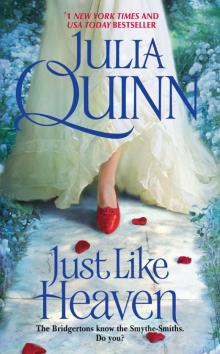 Just Like Heaven
Just Like Heaven B03.2 An Offer from a Gentleman Ep II
B03.2 An Offer from a Gentleman Ep II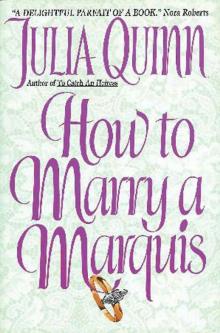 How to Marry a Marquis
How to Marry a Marquis When He Was Wicked: The 2nd Epilogue
When He Was Wicked: The 2nd Epilogue Ten Things I Love About You
Ten Things I Love About You The Viscount Who Loved Me
The Viscount Who Loved Me The Duke and I
The Duke and I B05.2 To Sir Philip With Love Ep II
B05.2 To Sir Philip With Love Ep II An Offer From a Gentleman: The 2nd Epilogue
An Offer From a Gentleman: The 2nd Epilogue Minx
Minx On the Way to the Wedding with 2nd Epilogue
On the Way to the Wedding with 2nd Epilogue Mr. Cavendish, I Presume
Mr. Cavendish, I Presume A Night Like This
A Night Like This Splendid
Splendid Everything and the Moon
Everything and the Moon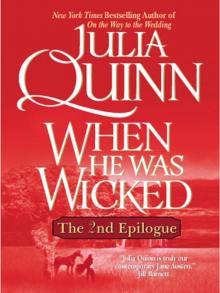 When He Was Wicked
When He Was Wicked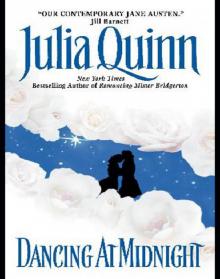 Dancing at Midnight
Dancing at Midnight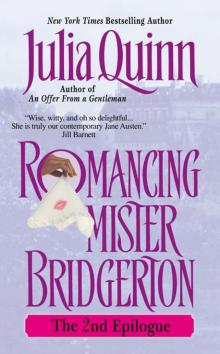 Bridgerton 04: 2nd Epilogue - Romancing Mister Bridgerton
Bridgerton 04: 2nd Epilogue - Romancing Mister Bridgerton The Lost Duke of Wyndham
The Lost Duke of Wyndham To Sir Phillip, With Love
To Sir Phillip, With Love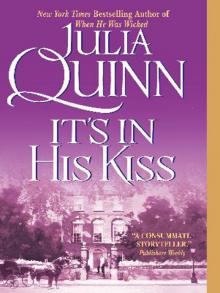 It's in His Kiss
It's in His Kiss The Other Miss Bridgerton
The Other Miss Bridgerton Bridgerton 02: 2nd Epilogue - The Viscount Who Loved Me
Bridgerton 02: 2nd Epilogue - The Viscount Who Loved Me The Secrets of Sir Richard Kenworthy
The Secrets of Sir Richard Kenworthy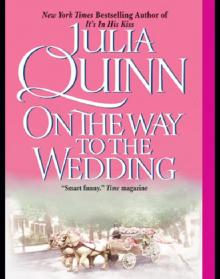 On the Way to the Wedding
On the Way to the Wedding The Secret Diaries of Miss Miranda Cheever
The Secret Diaries of Miss Miranda Cheever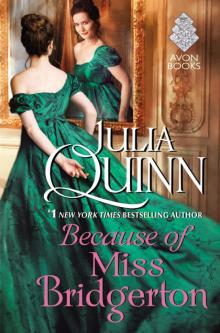 Because of Miss Bridgerton
Because of Miss Bridgerton What Happens in London
What Happens in London JQuinn - The Secret Diaries of Miss Miranda Cheever
JQuinn - The Secret Diaries of Miss Miranda Cheever The Girl With the Make-Believe Husband
The Girl With the Make-Believe Husband First Comes Scandal
First Comes Scandal To Catch an Heiress
To Catch an Heiress The Sum of All Kisses
The Sum of All Kisses An Offer From a Gentleman
An Offer From a Gentleman The Bridgertons: Happily Ever After
The Bridgertons: Happily Ever After Bridgerton Collection Volume 1 (Bridgertons)
Bridgerton Collection Volume 1 (Bridgertons)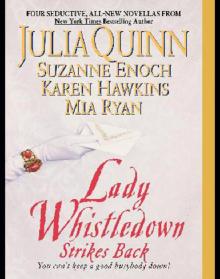 Lady Whistledown Strikes Back
Lady Whistledown Strikes Back Secret Diaries of Miss Miranda Cheever
Secret Diaries of Miss Miranda Cheever An Offer from a Gentleman with 2nd Epilogue
An Offer from a Gentleman with 2nd Epilogue Four Weddings and a Sixpence
Four Weddings and a Sixpence An Offer from a Gentleman: The Epilogue II
An Offer from a Gentleman: The Epilogue II The Further Observations of Lady Whistledown
The Further Observations of Lady Whistledown The Viscount Who Loved Me: The Epilogue II
The Viscount Who Loved Me: The Epilogue II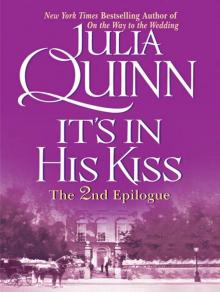 It’s In His Kiss Epilogue II
It’s In His Kiss Epilogue II To Sir Phillip, with Love: The Epilogue II
To Sir Phillip, with Love: The Epilogue II The Secret Diaries of Miss Miranda Cheevers
The Secret Diaries of Miss Miranda Cheevers A Night Like This (Smythe-Smith Quartet)
A Night Like This (Smythe-Smith Quartet) The Lady Most Likely...
The Lady Most Likely... Bridgerton 06: 2nd Epilogue - When He Was Wicked
Bridgerton 06: 2nd Epilogue - When He Was Wicked Just Like Heaven sq-1
Just Like Heaven sq-1 Gretna Greene
Gretna Greene